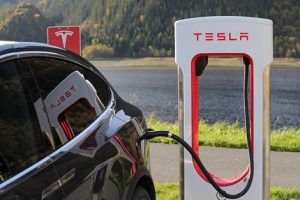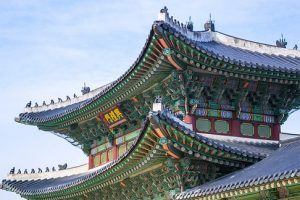Another signal for China’s efforts to improve the protection of property rights comes from a new ruling by the Beijing court: Tesla, the American manufacturer for sustainable transport, recently won a case for the cancellation of a similar trademark registration.
Tesla won before Beijing Intellectual Property Court
 China will strengthen the protection of property rights in order to provide sustained impetus for economic development, it was said last week after an executive meeting of the Chinese State Council chaired by Prime Minister Li Keqiang. And that is how the Beijing Intellectual Property Court ruled a few weeks ago. Tesla prevailed with the claim of trademark cancellation against the state administration for industry and commerce (Trademark Review and Adjudication Board, TRAB) and the also defendant, the Trading Company Beijing Hua Ruikai.
China will strengthen the protection of property rights in order to provide sustained impetus for economic development, it was said last week after an executive meeting of the Chinese State Council chaired by Prime Minister Li Keqiang. And that is how the Beijing Intellectual Property Court ruled a few weeks ago. Tesla prevailed with the claim of trademark cancellation against the state administration for industry and commerce (Trademark Review and Adjudication Board, TRAB) and the also defendant, the Trading Company Beijing Hua Ruikai.
Are goods similar even if they are registered in different classes?
Interesting in this case is the Court’s assessment of whether goods are similar when they fall under different classes of the Chinese classification of goods and services. The decision as to whether goods or services are similar is made on a case-by-case basis. Generally speaking, goods or services that fall under different classes or subclasses are not similar. However, goods are considered to be similar if they are relatively similar in function, purpose, distribution and consumer groups. This means that China complies to a large extent with the requirements of WIPO, the Nice Classification and the Standard for Trial of Similar Goods or Services.
Tesla filed an action for annulment against a registered trademark of the defendants in Class 9 (11485034) on the following grounds:
- the trade mark is a similar trade mark relating to similar goods in comparison with Tesla’s earlier trade marks registered in Class 12 (No 7792673 and No 8008885)
- the mark infringes Tesla’s trademark right on purpose
Nice-classfication
The trademark of the defendant, the Trading Company Beijing Hua Ruikai, had been issued to the defendant, designated goods of class 9, such as electric welding and soldering equipment, but also vehicle batteries. Teslas trade mark registrations include class 12 goods such as boats, aircraft, bicycles, but also engines and drives for land vehicles.
The Trademark Review and Adjudication Board (TRAB) rejected Tesla’s application for annulment in 2015. However, the TRAB did not explain its decision. Tesla refused to accept the ruling and filed a complaint with the Beijing Intellectual Property Court.
Beijing Intellectual Property Court overturned TRAB decision
 The Beijing Intellectual Property Court annulled TRAB’s decision and found that the goods are similar and Tesla had rightly applied for annulment.
The Beijing Intellectual Property Court annulled TRAB’s decision and found that the goods are similar and Tesla had rightly applied for annulment.
The court gave the following justification:
- Tesla presented evidence such as demonstrations of her practice in the business, media reports and documents to demonstrate that batteries and electric vehicles are closely related to each other in terms of function, type of use, manufacturing department, distribution channel and target consumer.
- The most important part of an electric vehicle is the battery, which is always sold together with electric vehicles.
- When consumers need to change the battery, they will usually first visit the original manufacturer. And the original battery manufacturer is Tesla.
Chinese courts for intellectual property have a good reputation
It was not until the end of 2014 that three courts for exclusive intellectual property rights were established in China, in Beijing, Shanghai and Guangzhou. By October 2017, more than 33,000 cases had been decided there, according to the report of the Supreme People’s Court in China. The Beijing IP Court deals with patent, trademark, copyright and unfair competition litigation. It has the power to issue injunctions and to grant damages. Since its establishment in 2014, the court has earned a reputation for fair and equitable judgment. Amongst others, Qualcomm won a patent dispute with the Chinese smartphone manufacturer Meizu. And now the American company Tesla was win against the state administration for industry and commerce (Trademark Review and Adjudication Board, TRAB).
Intellectual Property Dispute between China and the USA
It was in October 2017 that there was a dispute between China and the USA over the protection of intellectual property in China. The reason for this was an American investigation into China’s alleged illegal transfer of intellectual property rights under Section 301, which China does not recognise. And points out that there are more than 90 bilateral working groups between the two major economies. Infringements of intellectual property rights would be committed not only in China but also in the USA, say the Chinese.
Maybe these cases are also interesting for you:
- Import ban on iPhones in China? Qualcomm sued Apple in China (Nov 2017)
- Chinese Court ruled infringement of domestic shoemakers (Aug 2017)
- Trump orders investigation against China (Aug 2017)
- First Time in China: Chivas granted Judicial Protection (March 2017)
- How to protect your brand for the Chinese market (May 2016)
Are you interested in trade mark protection for your company?
Please take your chance and contact us. Our lawyers are experienced in trademark and patent law, national and international law.
Sources:
Beijing IP Court Decision Tesla
pictures:
Free_Photos /pixabay.com / CCO License || Blomst /pixabay.com / CCO License







